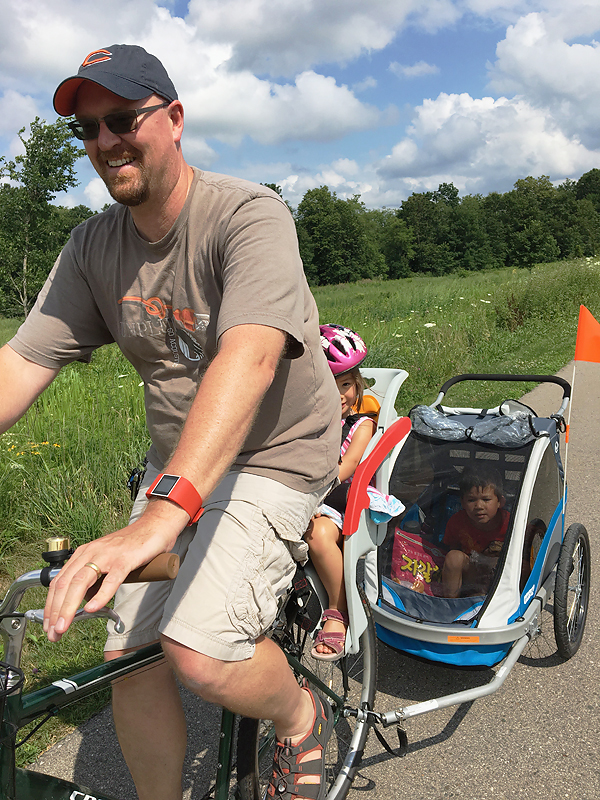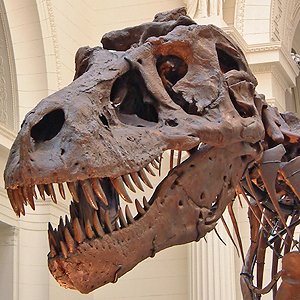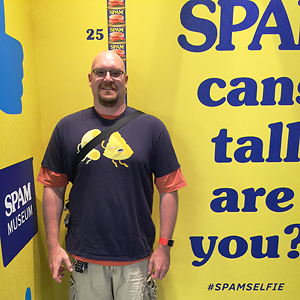

It was a general interest in computing that led David McClintock, MD to a specialty in Pathology Informatics. Early in his residency at the University of Chicago, where he also earned his undergraduate and graduate degrees in the Social Sciences and attended medical school, McClintock became known as the go-to for help with computers. "I was speaking the language of informatics at a time when they didn’t have anyone else who was," he recalls.

McClintock was included in meetings on imaging and other informatics topics that he wouldn't otherwise be invited to as a resident - it was these interactions that started him thinking seriously about Pathology Informatics as a career. Around the same time, he attended the Advancing Practice, Instruction, and Innovation through Informatics (APIII) conference (now known as the Pathology Informatics Summit). There he heard Pathology Informatics Program Directors, such as Michigan Medicine's Ulysses Balis, MD and Massachusetts General Hospital's John Gilberston, MD, speak about the opportunities that Pathology Informatics fellowships offered going forward. He applied for a fellowship at MGH in Boston, was accepted, and he completed a two-year Clinical Fellowship in Pathology Informatics.
 There's a common misconception that informatics is synonymous with Information Technology, or IT. "With IT, the emphasis is on tools for the data creation and manipulation," McClintock starts, adding that you're trying to install and implement specific tools, including servers and applications. Informatics, in contrast, is looked at more from a data-centric point of view - you look at the whole picture, think about how a problem can be solved in the most efficient way, then pick and choose the tools across disciplines that allow you to complete the job, all while still maintaining the original intent of the information you started with. "The best definition I have for Informatics is that one should always try to communicate the right information, to the right person, at the right place in time, in the right way."
There's a common misconception that informatics is synonymous with Information Technology, or IT. "With IT, the emphasis is on tools for the data creation and manipulation," McClintock starts, adding that you're trying to install and implement specific tools, including servers and applications. Informatics, in contrast, is looked at more from a data-centric point of view - you look at the whole picture, think about how a problem can be solved in the most efficient way, then pick and choose the tools across disciplines that allow you to complete the job, all while still maintaining the original intent of the information you started with. "The best definition I have for Informatics is that one should always try to communicate the right information, to the right person, at the right place in time, in the right way."
"The best definition I have for Informatics is that one should always try to communicate the right information, to the right person, at the right place in time, in the right way."
McClintock recently left the University of Chicago, where he was an Assistant Professor and Medical Director of Pathology Informatics, to join Michigan Medicine’s Department of Pathology as Associate Professor and Director of Digital Pathology. He joins Pathology Informatics Division Director, Dr. Ulysses Balis, and Assistant Professor Jerome Cheng, MD. "I liked the idea of coming to Michigan because it has such a strong Pathology Informatics group," says McClintock. "Having two full-time informaticist faculty to work and collaborate with, on both the operations and research fronts is a big deal."
An opportunity to move to a smaller city, with more room between neighbors, was also appealing to McClintock, who has three small children with his wife. The family is enjoying exploring their new surroundings; taking advantage of opportunities for biking, visiting local orchards, being outdoors, and taking in the Michigan sunsets. One favorite Ann Arbor activity to date was attending a screening of Disney's Beauty and the Beast at Michigan Stadium. "That was cool for the kids and fun to walk through the big tunnel and sit on the field – my kids still talk about the time they went to the 'Big-M movie theater' with fondness."
Much of McClintock's first year will be spent working on projects related to Pathology’s $160M Pathology Relocation and Renovation. This effort will co-locate a large portion of Michigan Medicine's clinical pathology teams and educational programs to the North Campus Research Complex in spring of 2018. Renovation of University Hospital will follow to house a new Core Laboratory, as well as specific hospital-based functions, resulting in improved support for both patients and providers. McClintock will work with his team to complete PathTrack, a new system for tracking specimens each step of the way from their point of origin to delivering pathology reports to clinicians. He is also working on the development of a vision and a five-year plan for Digital Pathology laying the groundwork for how Michigan Medicine will enter into a completely digital anatomic pathology workflow. McClintock says, "For me, Digital Pathology enables us to take advantage of virtual workflows - we can redesign and optimize Anatomic Pathology from the ground up, adding value to the process and providing efficiencies of scale that couldn't be achieved in the past."
Fun Facts About Dr. McClintock |
||||||
 |
McClintock has a degree in Physical Anthropology and, while in college, volunteered at Chicago's Field Museum, preparing dinosaur fossils for the exhibit.
|
 |
Part of the reason McClintock moved to Michigan was that he knew it would allow him the opportunity to buy a pick-up truck, something he's wanted since growing up in rural Minnesota.
|
|||
|
|
Is the President-elect of the Association for Pathology Informatics and will serve as President for 2018.
|
 |
Loves Autumn and has a passion for carving pumpkins and cooking Thanksgiving dinners.
|
|||
 |
Also has a love for SPAM and has taken the opportunity to visit the SPAM Museum in Minnesota where he found out he's 23.5 'spam cans' tall.
|
|||||
 ON THE COVER
ON THE COVER
Breast team reviewing a patient's slide. (From left to right) Ghassan Allo, Fellow; Laura Walters, Clinical Lecturer; Celina Kleer, Professor. See Article 2014Department Chair |

newsletter
INSIDE PATHOLOGYAbout Our NewsletterInside Pathology is an newsletter published by the Chairman's Office to bring news and updates from inside the department's research and to become familiar with those leading it. It is our hope that those who read it will enjoy hearing about those new and familiar, and perhaps help in furthering our research. CONTENTS
|
 ON THE COVER
ON THE COVER
Autopsy Technician draws blood while working in the Wayne County morgue. See Article 2016Department Chair |

newsletter
INSIDE PATHOLOGYAbout Our NewsletterInside Pathology is an newsletter published by the Chairman's Office to bring news and updates from inside the department's research and to become familiar with those leading it. It is our hope that those who read it will enjoy hearing about those new and familiar, and perhaps help in furthering our research. CONTENTS
|
 ON THE COVER
ON THE COVER
Dr. Sriram Venneti, MD, PhD and Postdoctoral Fellow, Chan Chung, PhD investigate pediatric brain cancer. See Article 2017Department Chair |

newsletter
INSIDE PATHOLOGYAbout Our NewsletterInside Pathology is an newsletter published by the Chairman's Office to bring news and updates from inside the department's research and to become familiar with those leading it. It is our hope that those who read it will enjoy hearing about those new and familiar, and perhaps help in furthering our research. CONTENTS
|
 ON THE COVER
ON THE COVER
Director of the Neuropathology Fellowship, Dr. Sandra Camelo-Piragua serves on the Patient and Family Advisory Council. 2018Department Chair |

newsletter
INSIDE PATHOLOGYAbout Our NewsletterInside Pathology is an newsletter published by the Chairman's Office to bring news and updates from inside the department's research and to become familiar with those leading it. It is our hope that those who read it will enjoy hearing about those new and familiar, and perhaps help in furthering our research. CONTENTS
|
 ON THE COVER
ON THE COVER
Residents Ashley Bradt (left) and William Perry work at a multi-headed scope in our new facility. 2019Department Chair |

newsletter
INSIDE PATHOLOGYAbout Our NewsletterInside Pathology is an newsletter published by the Chairman's Office to bring news and updates from inside the department's research and to become familiar with those leading it. It is our hope that those who read it will enjoy hearing about those new and familiar, and perhaps help in furthering our research. CONTENTS
|
 ON THE COVER
ON THE COVER
Dr. Kristine Konopka (right) instructing residents while using a multi-headed microscope. 2020Department Chair |

newsletter
INSIDE PATHOLOGYAbout Our NewsletterInside Pathology is an newsletter published by the Chairman's Office to bring news and updates from inside the department's research and to become familiar with those leading it. It is our hope that those who read it will enjoy hearing about those new and familiar, and perhaps help in furthering our research. CONTENTS
|
 ON THE COVER
ON THE COVER
Patient specimens poised for COVID-19 PCR testing. 2021Department Chair |

newsletter
INSIDE PATHOLOGYAbout Our NewsletterInside Pathology is an newsletter published by the Chairman's Office to bring news and updates from inside the department's research and to become familiar with those leading it. It is our hope that those who read it will enjoy hearing about those new and familiar, and perhaps help in furthering our research. CONTENTS
|
 ON THE COVER
ON THE COVER
Dr. Pantanowitz demonstrates using machine learning in analyzing slides. 2022Department Chair |

newsletter
INSIDE PATHOLOGYAbout Our NewsletterInside Pathology is an newsletter published by the Chairman's Office to bring news and updates from inside the department's research and to become familiar with those leading it. It is our hope that those who read it will enjoy hearing about those new and familiar, and perhaps help in furthering our research. CONTENTS
|
 ON THE COVER
ON THE COVER
(Left to Right) Drs. Angela Wu, Laura Lamps, and Maria Westerhoff. 2023Department Chair |

newsletter
INSIDE PATHOLOGYAbout Our NewsletterInside Pathology is an newsletter published by the Chairman's Office to bring news and updates from inside the department's research and to become familiar with those leading it. It is our hope that those who read it will enjoy hearing about those new and familiar, and perhaps help in furthering our research. CONTENTS
|
 ON THE COVER
ON THE COVER
Illustration representing the various machines and processing used within our labs. 2024Department Chair |

newsletter
INSIDE PATHOLOGYAbout Our NewsletterInside Pathology is an newsletter published by the Chairman's Office to bring news and updates from inside the department's research and to become familiar with those leading it. It is our hope that those who read it will enjoy hearing about those new and familiar, and perhaps help in furthering our research. CONTENTS
|
 ON THE COVER
ON THE COVER
Rendering of the D. Dan and Betty Khn Health Care Pavilion. Credit: HOK 2025Department Chair |

newsletter
INSIDE PATHOLOGYAbout Our NewsletterInside Pathology is an newsletter published by the Chairman's Office to bring news and updates from inside the department's research and to become familiar with those leading it. It is our hope that those who read it will enjoy hearing about those new and familiar, and perhaps help in furthering our research. CONTENTS
|

MLabs, established in 1985, functions as a portal to provide pathologists, hospitals. and other reference laboratories access to the faculty, staff and laboratories of the University of Michigan Health System’s Department of Pathology. MLabs is a recognized leader for advanced molecular diagnostic testing, helpful consultants and exceptional customer service.